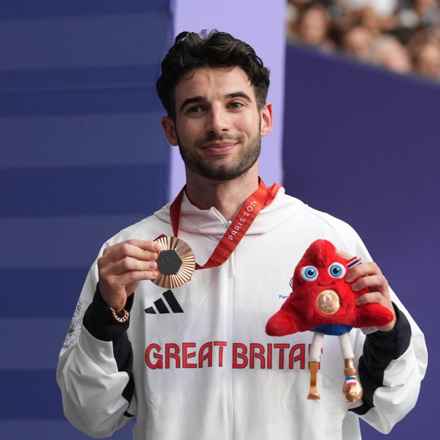“I wanted to feel like Stargardt didn’t hold me back”
Posted: Thursday 03 October 2024
Macular Society patron and sprinter Zac Shaw has opened up about his inspiring experience at the Paris 2024 Paralympics, where he secured two medals – one silver and one bronze.
The medals held extra significance for the 29-year-old after he missed out on the opportunity to compete at Rio 2016 and Tokyo 2020.
"I really did want a medal, but just becoming a Paralympian was a victory for me,” he said.
“Being able to call myself a Paralympian was a medal in itself.”
Becoming a Paralympian
Reflecting on finally achieving his ambition, he said: “I got used to not going to the Paralympics. I had to speak to a psychologist before I went out there a few times, because the idea of a Paralympics brought up quite a lot of negative emotions for me from the past.
“It did actually take me a few weeks to almost come to terms with the fact that I was going to go to the Paralympics,” he admitted.
Zac, who won his heat to qualify for the 100m final, initially finished fourth in race, not securing a place on the podium. But, following a retrospective disqualification in the men’s T12 100m of the gold medallist, Zac became a proud bronze medal winner.
Winning bronze
“I went to watch the athletics and I got a bus home and found out on the phone,” he said.
He added: “I definitely knew that it was a possibility that he would get disqualified, but with these sorts of things can take months or years, so for it to happen in four days was a bit of a surprise.”
But Zac acknowledged that it didn’t feel the same as winning it on the track. “It doesn’t feel the same, because I didn’t have that moment with my family with the flags.”
“A couple of them were only there for that race, so they never got to see or share the moment with me.”
A team silver
But the silver medal in the 4x100 relay race meant he had his moment on the podium.
As well as securing silver, the team, which consisted of his childhood hero Jonnie Peacock, took half a second off the European record in the heat and another half a second off the European record in the final race.
Talking about the race, Zac said: “The relay is the one thing you can’t be selfish in. It has to be for the team. I really wanted the team to have a medal and all share a moment.”
He added: “When I grew up, I watched London 2012 and I watched Jonnie Peacock on TV and he was one of the reasons I even started the sport. I was so inspired then to stand on a Paralympic podium next to him.”
Living in the moment
Zac is trying to enjoy the moment as he revels in his Paralympic success, and not think too much about what the future holds.
He said: “It’s hard because, I got asked four years ago, ‘What are you doing about Paris?’ and then you get to Paris and it’s ‘What’s next?’ But sometimes you’ve got to try really hard to just be like, ‘do you know what? This might be the best it'll ever get’.”
Being the best version of yourself
Zac was diagnosed with Stargardt disease at the age of 13 but has never let him hold him back from doing what he wants to do.
“Only you know what you're capable of doing or what your ambitions are. And this isn't about being an elite athlete. This could be about going to the gym three times a week or excelling in your work or studies. Sometimes other people don't necessarily know what you can do, and also other people don't care. We get wrapped in a world of social media where it's a case of, trying to impress other people, but sometimes it's just about having a goal in your head and just being satisfied if you can achieve it, or even if you don't achieve it, just trying your best to achieve a goal. For me personally, that's genuinely all it's been.”
Don't let sight loss hold you back
Zac reiterated that for him, success has never been about recognition or financial gain. He said: “As much as I appreciate everyone's support, I've never done this for money. I've never done it for a ‘well done’. I just do it because when I was younger, I got diagnosed with Stargardt disease. I just wanted to try and make that feel like it didn't hold me back.
He added: “People might look at me and think, ‘oh, wow, that's amazing’. But I look at people with sight loss, who have worse eyesight than me, that have degrees, and I don’t know how they have managed that, and that inspires me.
“Sometimes the medal looks shiny, but it's all about what your personal goals are and being the best person you can be.”
Share your story
Sharing your story can help raise awareness of the condition and the impact it can have on so many lives. It can also support others living with the condition or who are dealing with a recent diagnosis.
Support for you
We provide free information and support to those with macular disease, along with their family and friends, to help people keep their independence.




